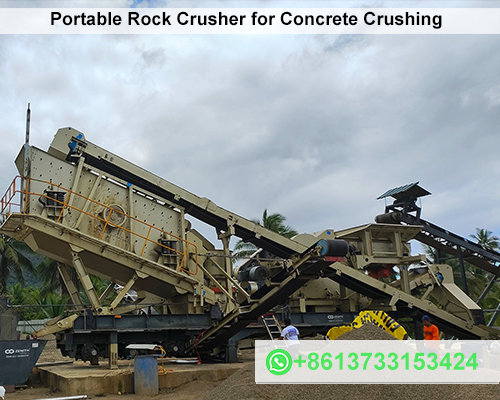Portable Rock Crusher for Concrete Crushing
Introduction
In the construction and demolition industries, efficiently recycling concrete waste is critical for reducing costs and environmental impact. A portable rock crusher has emerged as a game-changing solution for on-site concrete crushing. This article explores the benefits of using portable crushers, their applications, and key factors to consider when selecting the right equipment for your project.

Why Choose a Portable Rock Crusher for Concrete Crushing?
- On-Site Efficiency
Portable rock crushers eliminate the need to transport concrete waste to off-site recycling facilities. By crushing materials directly at the job site, contractors save time, fuel, and labor costs. - Versatility
These machines can process various materials, including concrete, asphalt, bricks, and natural rocks. Adjustable settings allow operators to produce different aggregate sizes for reuse in new construction projects. - Cost Savings
Recycling concrete reduces disposal fees and the expense of purchasing new materials. Portable crushers also minimize downtime by enabling immediate reuse of crushed aggregate. - Eco-Friendly Solution
Reducing landfill waste and lowering carbon emissions from transportation align with sustainable construction practices.
Key Applications of Portable Concrete Crushers
- Demolition Sites: Quickly process rubble into reusable base material for foundations or roads.
- Road Construction: Crush old concrete pavements to create sub-base layers for new roads.
- Urban Projects: Ideal for tight spaces in cities where transporting heavy machinery is challenging.
- Disaster Cleanup: Rapidly clear and recycle debris after natural disasters.
How to Choose the Right Portable Rock Crusher
- Crushing Capacity
Match the crusher’s output (tons per hour) to your project’s scale. Smaller units suit residential jobs, while larger models are ideal for commercial sites. - Mobility Features
Opt for track-mounted crushers for rough terrain or wheeled units for easier relocation on paved surfaces. - Power Source
Choose between diesel-powered crushers (for remote sites) or electric models (for noise-sensitive areas). - Maintenance Requirements
Look for crushers with easy-access components and durable wear parts to minimize downtime. - Budget
Balance upfront costs with long-term savings. Leasing options may be available for short-term projects.
Top Tips for Maximizing Crusher Performance
- Pre-Screen Materials: Remove debris like rebar or wood before crushing to avoid equipment damage.
- Regular Maintenance: Inspect belts, jaws, and hydraulics to ensure optimal operation.
- Train Operators: Proper training reduces wear and tear and improves safety.
Conclusion
A portable rock crusher for concrete crushing is a smart investment for contractors prioritizing efficiency, sustainability, and cost-effectiveness. By selecting the right machine and following best practices, you can transform concrete waste into valuable resources while streamlining your operations.









